ORP-PT06 Hospital Manual Transport Stretcher
A transport stretcher is a specialized piece of medical equipment designed primarily for the safe and efficient movement of patients within or between healthcare facilities. It serves as a fundamental tool in hospitals, clinics, and emergency medical services, facilitating the transfer of patients who are not ambulatory or need to remain in a recumbent position. Typically constructed from durable materials capable of withstanding frequent use, transport stretchers feature a wheeled base that allows for easy maneuverability across various surfaces. They are equipped with multiple functionalities such as adjustable height settings, protective side railings, locking mechanisms for stability, and provisions for medical apparatus like IV poles and oxygen cylinders. The design of transport stretchers emphasizes patient safety, comfort, and medical efficiency, incorporating features like ergonomically adjustable components, soft mattresses, and seamless integration with other medical equipment for comprehensive care during transit.
Technical Parameter:
| Bed Height Min | 565mm |
| Bed Height Max | 865mm |
| Overall Size (L*W) | 2067*713mm |
| Platform Size (L*W) | 1903*650mm |
| Safe Working Load | 250kg |
| Back-rest | 75°±10° |
| Net Weight | 75kg |
Technical Configuration:
| Back-Rest Gas Spring | 1pc |
| 6’’ Double-Side Casters | 4pcs |
| Central Locking Pedal | 2pcs |
| Directional Wheel Release Pedal | 1pc |
| Directional Wheel | 1pc |
| PP Side Rail | 4pcs |
| Oxygen Cylinder Holder | 1set |
| Metal Hand Crank | 1pc |
| IV Pole | 1set |
| IV Pole Prevision | 4pcs |
| Angle Indicator | 2pcs |
| Mattress | 1pc |
Product Introduction:
Quality Control:
- Technology: Transport stretcher is an essential tool in medical facilities for the safe and efficient movement of patients. One of the key advancements in their design is the use of one-step injection molding techniques, which ensure a seamless construction and enhance the stretcher’s durability and hygiene. High-quality materials, such as lightweight yet strong aluminum alloys and non-porous plastics, are chosen to withstand frequent use and rigorous cleaning protocols, contributing to the longevity and reliability of the stretchers. Additionally, manufacturers employ a 360° no blind spot welding process, which ensures that all joints are uniformly strong and free from weak spots, significantly enhancing the structural integrity of the stretcher. The robust construction of these stretchers ensures they can handle high weight capacities and resist impacts during use, making them a dependable choice in fast-paced medical environments. These technological advancements collectively improve the safety, functionality, and durability of transport stretchers, providing crucial support in patient care settings.
- Safety Standard: Transport stretcher is the subject to stringent safety standards to ensure they meet the essential requirements for medical use. Key among these standards are ISO 13485:2016 and ISO 9001:2015, both of which focus on quality management systems specifically tailored for the design and manufacture of medical devices. ISO 13485:2016 emphasizes the need for consistent design, development, production, and delivery of medical devices that are safe and fit for their intended purpose. ISO 9001:2015, while broader, complements this by focusing on customer satisfaction and the effectiveness of the quality management system. Additionally, transport stretchers often carry CE certification, indicating compliance with European health, safety, and environmental protection benchmarks. This certification is crucial as it not only underscores adherence to high safety and quality standards but also ensures the stretchers’ acceptability in the competitive European market.
- Design: The design of transport stretcher incorporates several thoughtful features to enhance usability and safety, one of which includes the integration of clear arrow symbols on the stretcher body. These symbols serve as intuitive guides that instruct users on how to correctly operate the stretcher, such as which direction to push or pull, where to apply force for adjustments, and how to lock or unlock wheels. This visual guidance is especially crucial in high-pressure situations common in medical environments, where quick, correct responses can significantly impact patient care outcomes. The arrows help to minimize user error and streamline the process of transporting patients, making the stretcher more efficient and safer to use for both medical personnel and patients. This user-centric design approach not only improves the functionality of the stretcher but also enhances overall safety by ensuring that all operational maneuvers are clearly communicated and easily understood.
Function:
- Back Section Adjustment: The back section adjustment mechanism on transport stretcher is designed for both ease of use and patient comfort. This critical feature allows medical personnel to adjust the incline of the back section to accommodate various medical conditions and procedures. To operate, the user simply lifts the handle located under the head of the back section. Once engaged, the handle can be pressed upward, allowing the back section to be smoothly adjusted to the desired position. The design permits a range of motion up to 75°±10°, providing substantial flexibility to meet different clinical needs, such as supporting a patient in a seated or semi-seated position for comfort or respiratory ease. This adjustable feature is essential for enhancing patient care during transport, as it allows for quick adjustments without needing to move the patient from the stretcher, thereby minimizing discomfort and potential strain.
- Whole Stretcher Height Adjustment: The whole platform height adjustment feature on transport stretcher is a vital component designed to enhance both patient accessibility and caregiver ergonomics. Controlled by a crank located at the foot of the stretcher, this mechanism allows the stretcher height to be adjusted smoothly between 565mm and 865mm. This range of height adjustment is crucial for accommodating various medical and emergency scenarios, enabling caregivers to set the stretcher at an optimal level for specific procedures or to facilitate easier patient transfers to and from the stretcher. By turning the crank, users can raise or lower the platform efficiently, ensuring that the stretcher can be quickly adapted to meet the immediate needs of the patient and the ergonomic requirements of medical staff, thereby reducing strain on both parties and enhancing the overall safety and effectiveness of patient handling.
Accessories Detail:
- Caster: The casters on transport stretcher are meticulously designed to ensure high performance and durability under the demanding conditions of medical environments. Each caster features a diameter of 150mm, optimizing the stretcher for smooth maneuverability across various floor types, from the polished surfaces of hospital corridors to the uneven pavements during emergency field operations. These double-sided wheels are crafted from materials that are both corrosion-resistant and wear-resistant, ensuring long-term functionality and reliability, even with frequent use. Additionally, the anti-winding design of the casters is a critical feature; it prevents common debris like wires, threads, or bandages from getting tangled around the wheel, which could otherwise impede movement and compromise safety. This thoughtful combination of features in the caster design significantly enhances the operational efficiency of transport stretchers, facilitating the safe and effortless transportation of patients.
- PP Side Rail: The side rails of transport stretcher are integral to ensuring patient safety and enhancing functionality during transfers. Designed with damping PP (polypropylene) material, these protective railings offer robust support and safety to patients while on the stretcher. The operation of these side rails is facilitated by a gas spring mechanism, which allows for smooth lifting and lowering with minimal effort. This feature is especially important in high-stress environments where quick and quiet adjustments are necessary. Additionally, when the protective railings are retracted, they fall seamlessly under the bed board. This design detail enables a flawless alignment and connection with other medical apparatus, such as transfer stretchers or operation tables, ensuring easy and safe patient transitions. Furthermore, these side rails include a smart notch design for the placement of infusion tubes, which helps in organizing and securing the tubes, preventing entanglement and ensuring that critical medications or fluids are delivered uninterrupted. This combination of safety, ease of use, and thoughtful integration with other medical equipment highlights the advanced design of the side rails on modern transport stretchers.
- Central LockingPedal: The central locking pedal system on transport stretcher is designed for enhanced control and safety, featuring two distinct pedals that simplify the braking and movement processes. The red pedal, when pressed, activates the overall stretcher brake, securely locking all wheels simultaneously. This immediate and reliable braking mechanism ensures that the stretcher remains stable and stationary when needed, particularly important during patient transfers or when the stretcher must remain fixed in a busy medical setting. Conversely, stepping on the blue pedal releases the brake, allowing the stretcher to be moved effortlessly. This distinction between the two pedals, marked by clear color coding, aids medical staff in quickly identifying and using the appropriate control, reducing the risk of errors under pressure. The dual-pedal system not only enhances the functionality of the stretcher but also contributes significantly to its safety features, making it highly convenient and efficient for medical staff during critical care and transport scenarios.
- Metal Hand Crank: The transport stretcher features a metal hand crank, a vital tool for adjusting the height of the bed board, essential for both patient comfort and caregiver ergonomics. By turning the crank clockwise, the bed board is smoothly raised, allowing for better access during medical examinations or treatments, or when transferring the patient to another bed. Conversely, turning the crank anticlockwise lowers the bed board, facilitating safer patient placement and reducing strain on healthcare workers during patient handling. This simple yet effective mechanical system ensures precise height adjustments without the need for electrical power, offering reliability and ease of use in various medical settings. The metal construction of the crank provides durability and withstands the rigorous use typical in a healthcare environment.
- Directional Wheel with Control Pedal: The directional wheel system on transport stretcher incorporates an innovative retractable 5th wheel, which significantly enhances maneuverability and control. This central wheel, when deployed, allows for effortless directional movement and precise cornering, enabling medical staff to navigate the stretcher through tight spaces and crowded hospital corridors with ease. The mechanism is user-friendly, featuring a simple step-down action: when medical personnel step on one side of the pedal system, the 5th wheel lowers into position, effectively directing the stretcher to move in a straight line. This is particularly useful in long hallways or when maintaining a stable, forward trajectory is crucial. Conversely, stepping on the opposite side retracts the 5th wheel, allowing the stretcher to freely turn and adapt to immediate spatial constraints or directional changes. This feature not only improves the operational flexibility of the stretcher but also enhances safety by providing stable and controlled movement, which is essential during the high-paced dynamics of medical emergencies.
- IV Pole: The IV pole on transport stretcher is thoughtfully designed to enhance patient care, featuring a durable stainless steel body that ensures longevity and cleanliness, crucial for medical environments. Equipped with a user-friendly height-adjusting knob, the pole can be easily customized to suit the specific needs of each patient, whether they are seated or lying down. This adjustability ensures that the IV fluids are consistently administered at the optimal height relative to the patient, promoting effective and uninterrupted fluid flow. Additionally, the pole is outfitted with four hooks, which allows it to hold multiple IV bags simultaneously. Each hook supports a substantial bearing capacity of up to 15kg, accommodating the weight of various medical solutions and equipment necessary for patient treatment. This robust design not only increases the functionality of the IV pole but also aids in streamlining patient care by keeping essential medications and fluids easily accessible and securely in place during transport.
- IV Pole Prevision: The transport stretcher is equipped with a highly functional IV pole prevision system, designed to enhance the flexibility and efficiency of medical care in transit. Strategically located at the four corners of the stretcher, each prevision point increases the accessibility and usability of IV poles from multiple angles, accommodating various clinical settings and patient needs. These previsions are uniquely engineered with a user-friendly switch mechanism. To install an IV pole, medical staff simply insert the infusion rod into the designated slot after pressing and breaking off the button. This action opens the prevision point. Once the IV pole is inserted, closing the switch securely locks the pole in place, ensuring stability and preventing any movement during transport. This design not only simplifies the setup process but also secures the IV pole robustly, minimizing the risk of dislodgement or shifting that could interrupt patient care during critical movements or transfers.
- Angle Indicator: The transport stretcher includes a practical feature designed to enhance patient care and staff convenience: angle indicators located under both sides of the back section. These indicators play a crucial role in clinical settings by displaying the precise angle of the backrest. As the back section is adjusted to accommodate patient needs—whether to improve respiratory function, comfort, or for specific medical procedures—staff can easily reference the angle indicators to ensure the backrest is positioned accurately. This allows for consistent and repeatable positioning, which is particularly important when managing patients with specific conditions that require precise postural adjustments. The clear visibility and easy accessibility of these indicators under each side of the back section ensure that adjustments can be made quickly and accurately, enhancing both the safety and the effectiveness of patient care during transport.
- Oxygen Cylinder Holder: The transport stretcher is equipped with an oxygen cylinder holder, a vital feature for ensuring the mobility and safety of patients requiring respiratory support. This holder is designed with two adjustable support rings, which accommodate oxygen cylinders of various sizes, making the stretcher versatile for use in diverse medical scenarios. The adjustability of the rings is straightforward, allowing medical personnel to quickly secure or change cylinders as patient needs dictate. This flexibility is crucial in emergency situations where time and proper oxygen delivery are critical. The support rings ensure that the oxygen cylinder is held firmly in place, preventing any movement that could disrupt the supply of oxygen or damage the cylinder during transport. This design not only enhances the functionality of the stretcher but also contributes to the overall safety and efficiency of patient care in transit.
- Mattress: The mattress on the transport stretcher is designed with both comfort and practicality in mind, ensuring that patients remain comfortable and supported during transport. At the core of the mattress is a soft sponge, chosen for its ability to conform to the patient’s body, providing both comfort and critical support to prevent pressure injuries during extended periods of immobility. Encasing this sponge is a waterproof, breathable mattress cover, which is essential for maintaining hygiene and comfort. The cover’s waterproof properties protect the mattress from fluids, which is a common challenge in medical settings, while its breathability helps to regulate temperature and moisture, enhancing patient comfort. Additionally, the thickness of the mattress is optional, allowing medical facilities to choose the appropriate level based on their specific needs and the comfort preferences of their patients. This combination of features makes the mattress an integral component of the transport stretcher, designed to meet the medical industry’s high standards for patient care and hygiene.
DIRECTIONAL WHEEL SYSTEM
Retractable 5th wheel provides effortless directional movement and cornering. Step down on one side so that the guide wheel lands, and the whole stretcher can only go straight. Step on the other side to turn.
IV POLE PREVISION
Four previsions are spread across the four corners of the stretcher. Each is designed with a switch, which is inserted into the infusion rod by breaking off the button, and then holding the infusion rod in place after closing.
METAL HAND CRANK
Turn the crank to adjust height. Tum clockwisely, the bed board will go up. Turn anticlockwisely, the bed board will go down.
OXYGEN CYLINDER HOLDER
Two adjustable support rings are used to hold oxygen cylinders of different sizes.
PP SIDE RAIL
Damping PP protective railings, lifting controlled by gas spring, When protective railing fall and retract under the bed board,can achieve seamless connection with the transfer stretcher or operation table. Infusion tube placement notch design.
ANGLE INDICATOR
Angle indicators are fixed under both sides of back section to show back-rest angles.
CASTER
Diameter 150mm, double-side wheel, corrosion-resistant, wear-resistant material, anti-winding design.
CENTRAL LOCKING PEDAL
Two central locking pedals, press the red one to achieve the overall stretcher brake. Step on the blue one can move the stretcher. Two pedals brake the entire stretcher convenient for the medical staff.





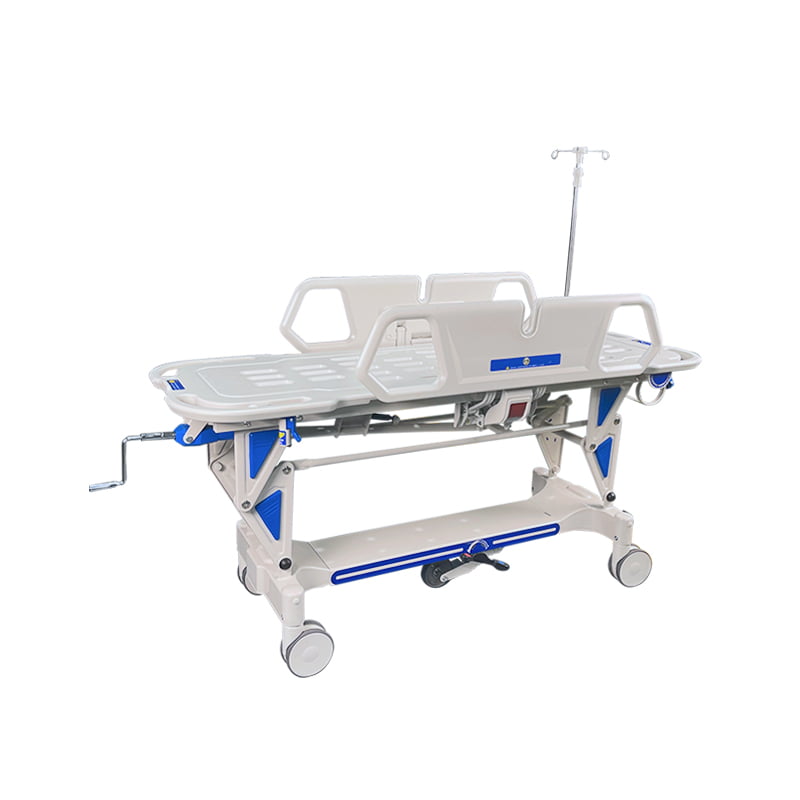

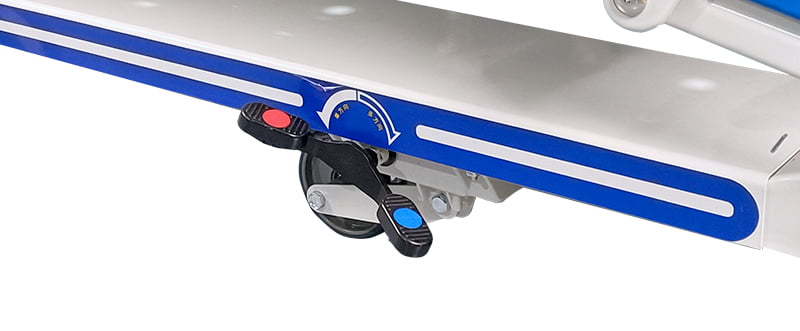
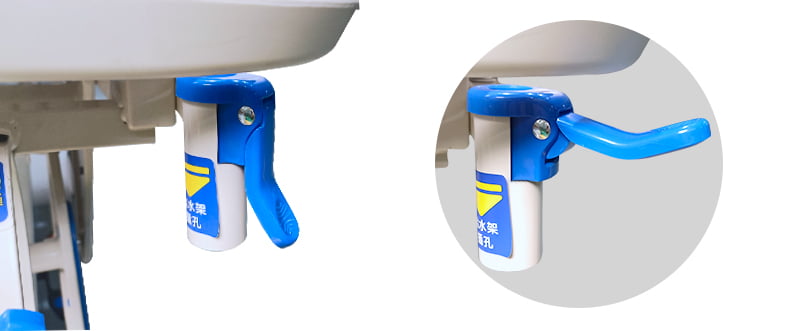
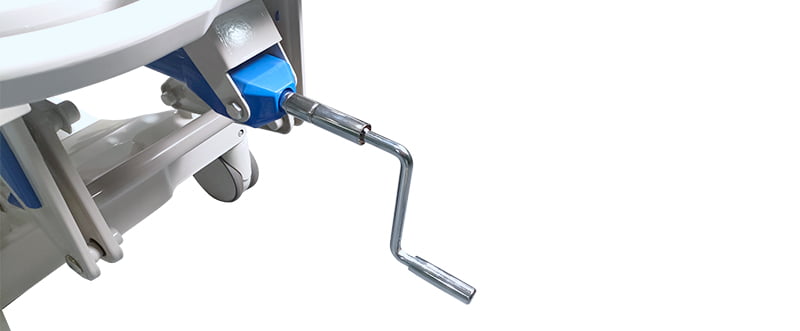
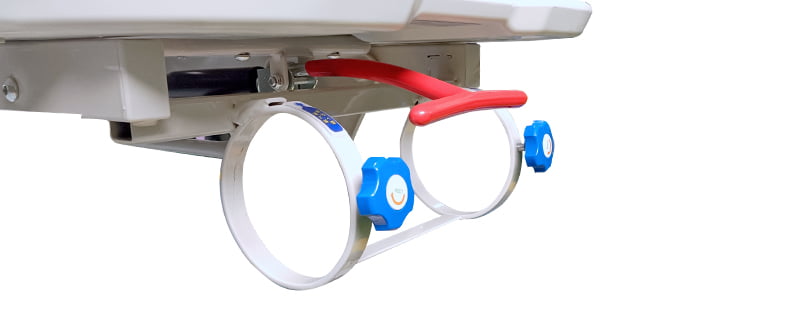
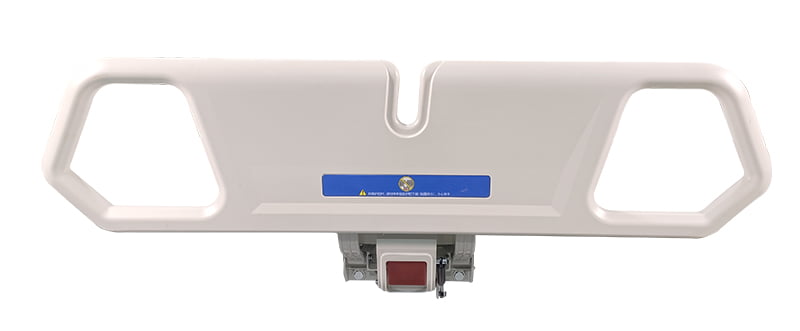
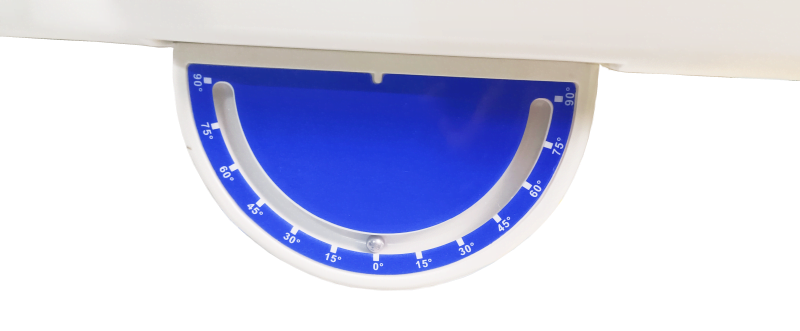
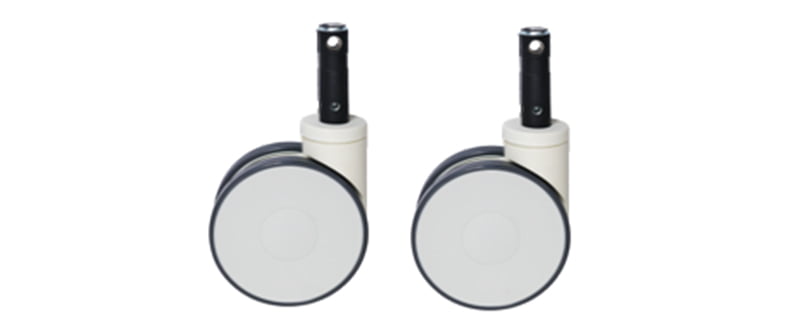
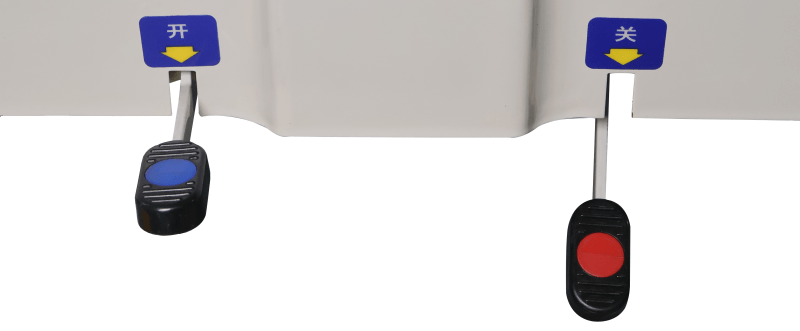
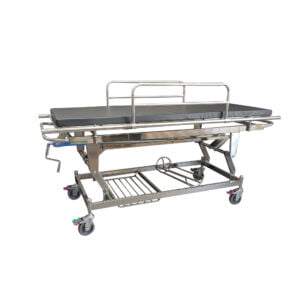
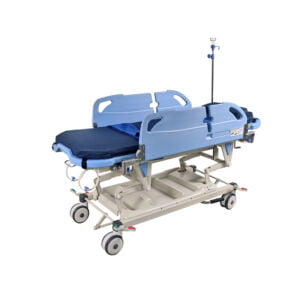
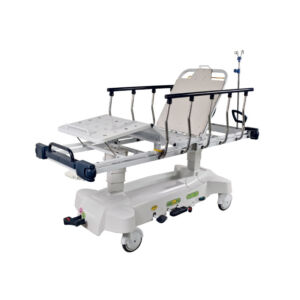
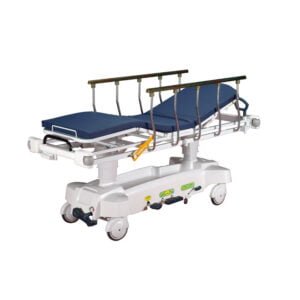

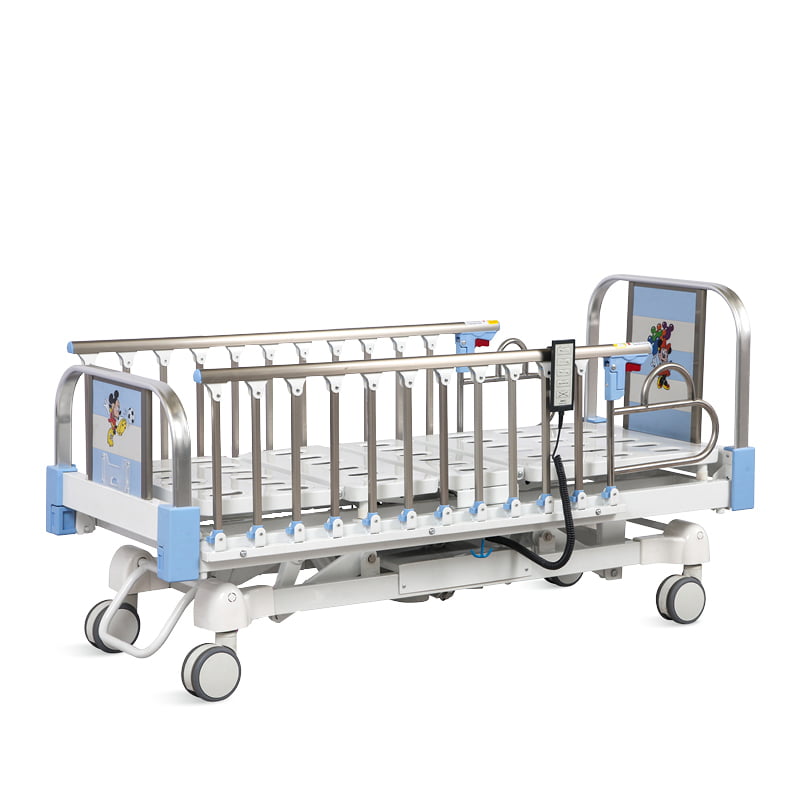
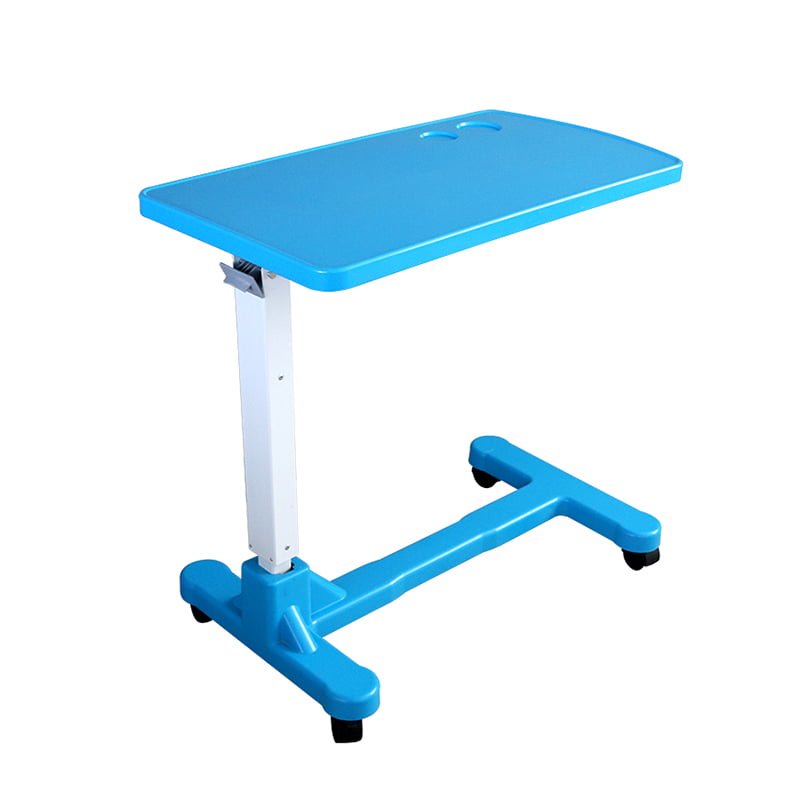
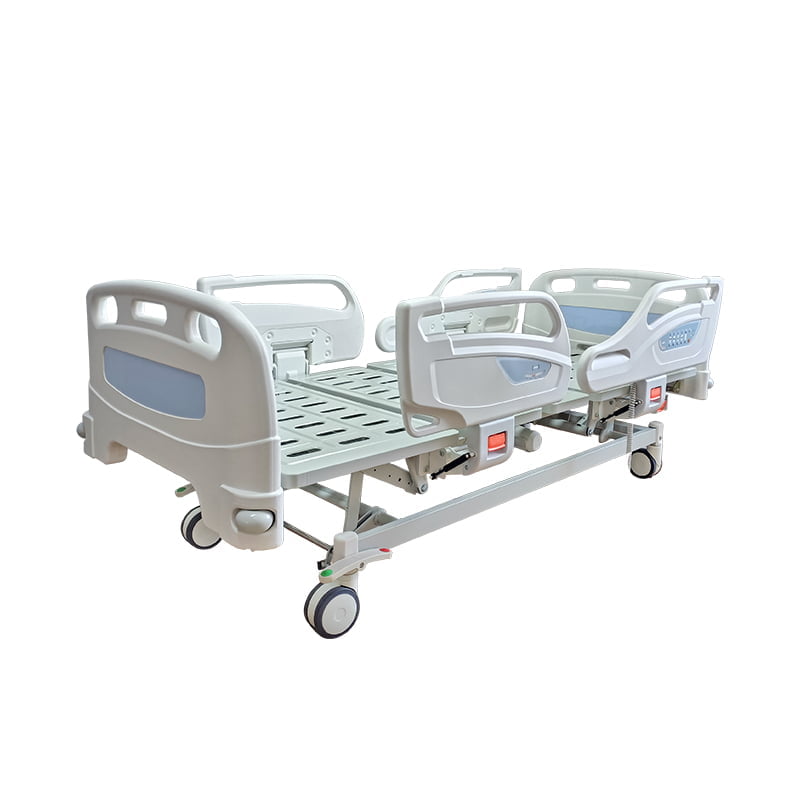
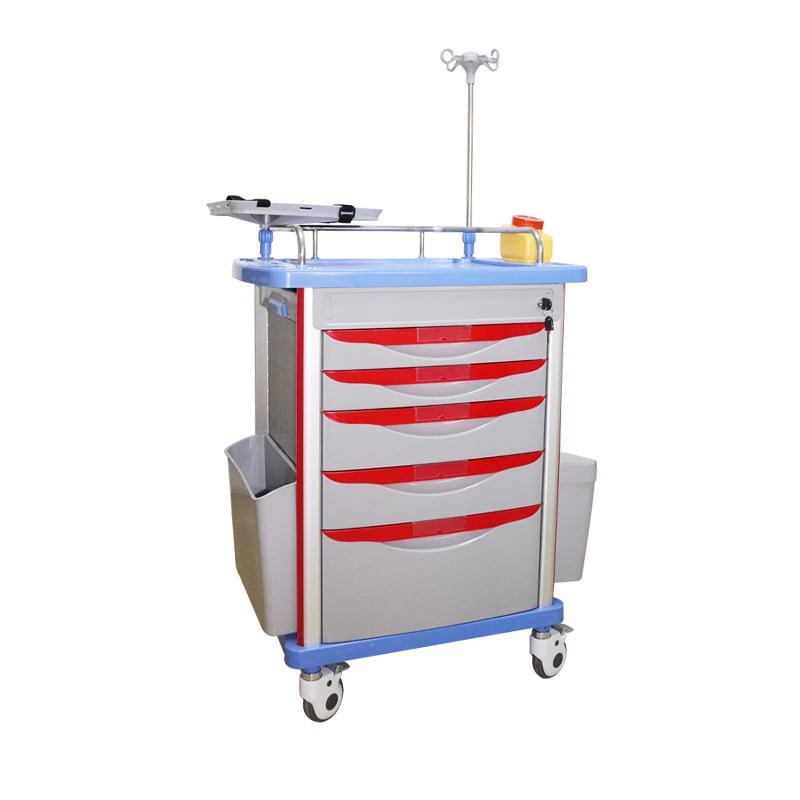
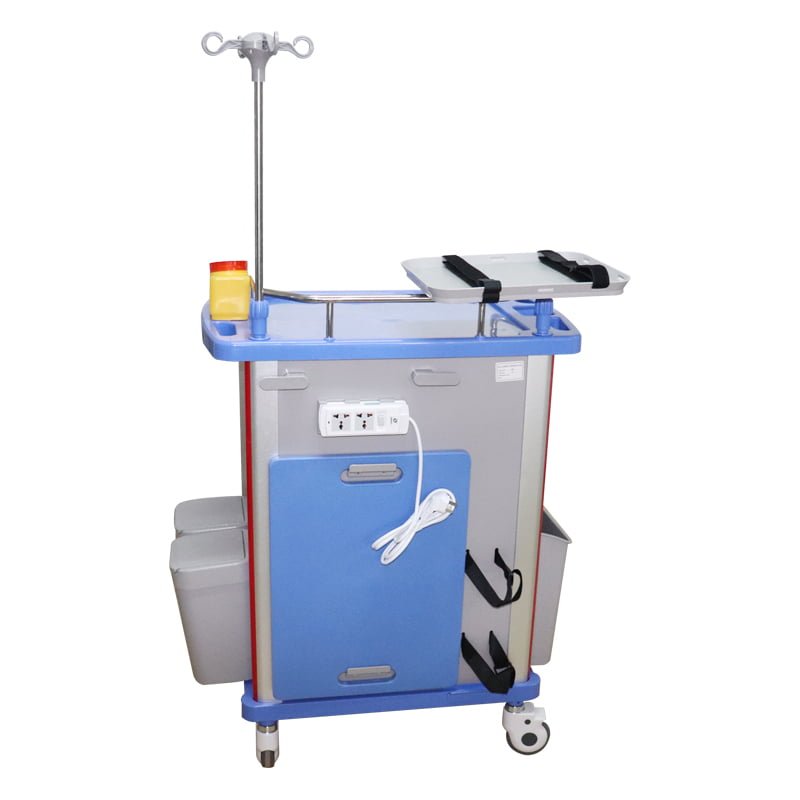
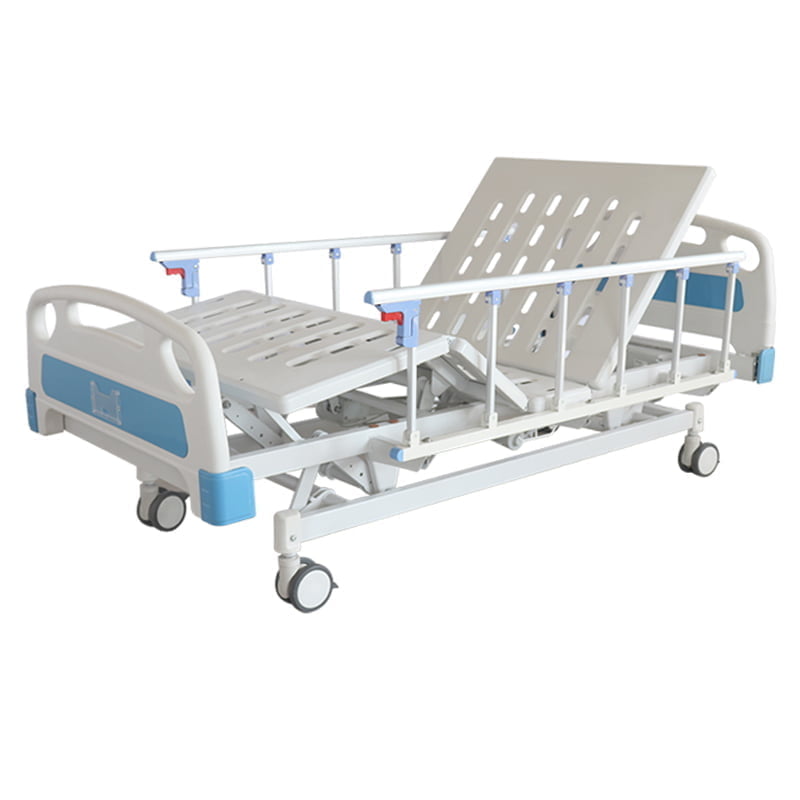
Reviews
There are no reviews yet.